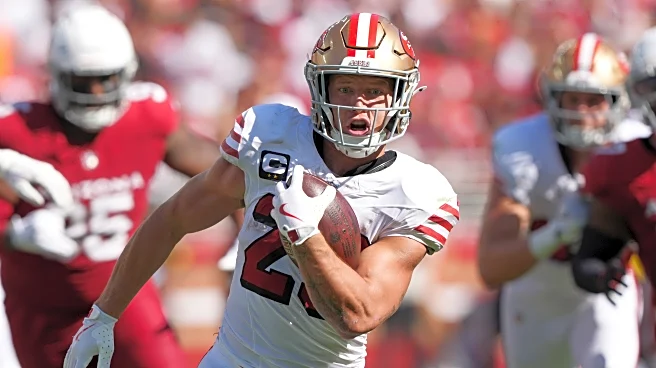The San Francisco 49ers lost their first NFC West game in Week 10 but will look to avoid back-to-back divisional losses with a trip to the desert to take on the Arizona Cardinals on Sunday.
When these two
faced back in Week 3, it was 49ers’ backup quarterback Mac Jones outlasting the Cardinals’ starting quarterback Kyler Murray in a 16-15 San Francisco victory. The roles will be reversed as Brock Purdy will make his first start since Week 4 against Jacoby Brissett, who will be making his fifth start since replacing the injured Murray.
While Brissett has lifted Arizona’s offense, he’ll be without two weapons as he navigates the 49ers’ defense. That’s where we start this week’s numbers to know:
No targets for Jacoby Brissett
Arizona will be without 26.3 percent of its targets with Marvin Harrison and Zay Jones ruled out on Sunday.
With the state the 49ers defense is in right now, any break is helpful, and they’ll catch two on Sunday with Harrison (appendicitis) and Jones (Achilles) already ruled out. Arizona’s offense has already had its share of struggles, ranking 20th in points scored and 21st in yards gained.
The offense has had a bit of a resurgence under Brissett, averaging 24.8 points per game —an improvement over the 20.6 it averaged in the five games started by Kyler Murray. Harrison and Jones have both benefited from the Brissett era.
In five games with Murray, Harrison averaged 6.4 targets per game, with only one game with 10 or more targets when he had exactly 10 targets in the Week 4 loss to Seattle. After just eight targets in his first two games with Brissett as the starter, Harrison has seen 22 targets in the last two, upping his average to 7.5 targets per game with Brissett, including his best game of the season, going for 97 yards and a touchdown in the Week 9 victory over Dallas.
Jones, like Harrison, had his best game of the season with Brissett. After only seeing seven targets for five receptions and 37 yards in four games with Murray, Brissett wasted no time making a connection with Jones. In Brissett’s first start this season against Indianapolis, Jones finished with five receptions on eight targets for a team-high 79 yards.
While the 49ers will still have their hands full with Trey McBride, who exploded for a season-high 127 yards in Week 10 in the loss to Seattle, it’ll be a sight for sore eyes that San Francisco won’t have to worry about Harrison or Jones, who are the two leaders in yards per reception for the Cardinals.
No pass rush for Brock Purdy to worry about
The Cardinals’ defense creates pressure on 18.6 percent of dropbacks, the 11th-lowest rate in the league, according to Pro Football Reference.
After missing all but two games with a right toe injury, Brock Purdy makes his return on Sunday, and his mobility might be in question depending on just how well that toe has healed. With Arizona, Purdy will be faced with one of the bottom-half pass rushes in the league.
Only six teams have fewer sacks this season than the Arizona Cardinals – the 49ers being one of them – meaning Purdy might not have as much stress on his own Sunday as he would have, say, last week against Los Angeles, who have a top ten pressure rate in the league. Instead of rushing him back in a game he could have played in, according to Kyle Shanahan, the 49ers took a more patient route and waited an extra week, allowing Purdy to return against the lesser pass rush.
Now, that’s not to say it’ll be the easiest of tasks for the 49ers’ offensive line against Arizona. San Francisco has allowed pressure on 20.2 percent of dropbacks, 18th-best in the league. This same offensive line allowed 19 pressures on 43 dropbacks when the 49ers beat the Cardinals back in Week 3, but Mac Jones was only sacked once.
Purdy’s mobility is definitely better than Jones’s, so that alone should help the offense. But just how mobile will Purdy be returning after two months with a toe injury? We will find out on Sunday.
The Cardinals’ offense thrives between the 20s
The Cardinals’ offense averages 6.55 plays per drive, the fourth-highest average in the league.
And that number has only improved over the last four weeks, with the Cardinals averaging 7.0 plays per drive in the 41 drives since Brissett took over the starting job.
The 49ers’ defense has struggled to prevent long drives, allowing 6.3 plays per drive, tied with six other teams for the seventh-most. It’s been especially an issue over the last few weeks, with the San Francisco defense allowing scoring drives of 16, 10, 11, 12, 10, 10, 10, and 12 over the last three weeks, and the team is 1-2 in those games.
What’s peculiar about Arizona’s long drives, however, is that they’ve struggled getting in the endzone despite it. While ranked fourth in average plays per drive, Arizona ranks 17th in scoring percentage, scoring points on just 39.6 percent of drives, and ranks 20th in points per drive at 2.11.
As already mentioned, Arizona has improved offensively under Brissett in more ways than one, but will be without two of Brissett’s favorite targets. While San Francisco’s defense is pretty injured, Arizona’s offense has been rolling, but it will be dealing with some injuries of its own. It’s on Robert Saleh and the 49ers defense to take advantage.









